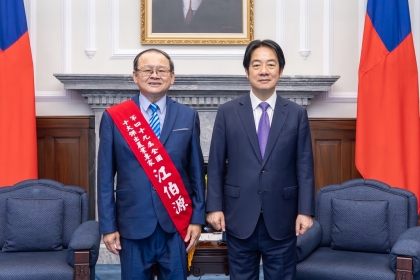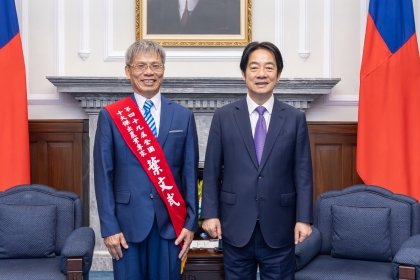NCHU Professors Chiang and Yeh Named Among Taiwan’s Top Ten Distinguished Agricultural Experts
2025-09-02
興新聞張貼者
Unit秘書室
1,176
Chiang, Po-Yuan, Distinguished Professor in the Department of Food Science and Biotechnology at National Chung Hsing University (NCHU), and Professor Yeh, Wen-Bin, Chair of the Department of Entomology, have been honored as recipients of the 49th Top Ten Distinguished Agricultural Experts Award. The recognition highlights their long-standing and outstanding contributions in agricultural product processing, biomedical applications, agricultural pest quarantine, and international agricultural trade. It also reflects NCHU’s continued commitment to driving innovation and strengthening Taiwan’s global presence in the agricultural sector.
Professor Chiang: Bridging Theory and Practice, a Pioneer in Agricultural Processing
Professor Chiang, Po-Yuan has devoted his career to the processing and development of value-added products from domestic agricultural crops. His work has successfully transformed white rice, brown rice, purple rice, buckwheat, wheat, peanuts, soybeans, black beans, red beans, mung beans, kidney beans, millet, Job’s tears, sweet potatoes, and potatoes into a wide range of products such as snacks, nutrition bars, and baked goods. By introducing standardized production processes and quality specifications, he has helped diversify grain processing in Taiwan and bring these products to market. To date, Professor Chiang has published over 100 papers in domestic and international journals, facilitated numerous technology transfers, and contributed to the development of more than 50 commercialized products, generating significant added value for Taiwan’s agriculture.
In the field of agricultural by-product reutilization, Professor Chiang has incorporated the principles of the circular economy, converting materials such as water caltrop shells, pineapple peels, rice bran, and sweet potato skins into functional dietary fibers, health-promoting ingredients, and high-value products. He has also advanced biomedical carrier technologies to improve the stability and bioavailability of plant-derived active compounds, opening new opportunities in preventive medicine and functional food markets. His team is recognized as one of Taiwan’s most innovative and versatile research groups in agricultural by-product processing. Their achievements include multiple patents and numerous industry-academia collaborations, establishing new models for the sustainable development of Taiwanese agriculture.
In addition to his research achievements, Professor Chiang also serves as Director of the Food Science and Biotechnology Pilot Plant and Deputy Director of the Agricultural Product Verification Center, where he actively fosters talent with hands-on expertise, bridging academic knowledge with industry applications. His outstanding contributions to academia, industry, and education have earned him prestigious honors, including the Academic Excellence Award from the Agricultural Chemical Society of Taiwan and the Chinese Sustainable Agriculture Association, as well as the Promotion and Service Award from the Taiwan Association for Food Science and Technology.
Professor Yeh: Applying Science to Safeguard Agricultural Trade and Biosecurity
Professor Yeh, Wen-Bin, Chair of the Department of Entomology, specializes in molecular identification of agricultural pests, quarantine treatments for fresh produce, and risk assessment for imported agricultural products. Over the years, he has supported Taiwan’s agricultural exports and import quarantine efforts, significantly enhancing the efficiency and scientific rigor of pest management. His team established a DNA barcode database for agricultural pests and developed rapid identification technologies that reduce the diagnostic process from several days to just a few hours, substantially improving border quarantine efficiency and protecting Taiwan’s ecosystems.
In the area of quarantine treatment for fresh produce, Professor Yeh has developed internationally compliant high- and low-temperature pest eradication processes for key fruits such as mangoes, guavas, dragon fruit, papayas, and lychees. These methods eliminate pests while maintaining fruit quality, enabling Taiwan’s produce to successfully access global markets and provide stable income for local farmers.
Additionally, Professor Yeh has assisted the government in conducting risk assessments for the importation of fresh fruits from multiple countries, including pomegranates from Peru, grapefruits from the United States, and blueberries from Argentina. These assessments have provided precise pest risk analyses that allow consumers in Taiwan to safely enjoy premium produce from around the world. His research findings, frequently published in international journals, also serve as critical scientific evidence in trade negotiations, reinforcing Taiwan’s professional standing in the field of international agricultural quarantine.
Professor Chiang: Bridging Theory and Practice, a Pioneer in Agricultural Processing
Professor Chiang, Po-Yuan has devoted his career to the processing and development of value-added products from domestic agricultural crops. His work has successfully transformed white rice, brown rice, purple rice, buckwheat, wheat, peanuts, soybeans, black beans, red beans, mung beans, kidney beans, millet, Job’s tears, sweet potatoes, and potatoes into a wide range of products such as snacks, nutrition bars, and baked goods. By introducing standardized production processes and quality specifications, he has helped diversify grain processing in Taiwan and bring these products to market. To date, Professor Chiang has published over 100 papers in domestic and international journals, facilitated numerous technology transfers, and contributed to the development of more than 50 commercialized products, generating significant added value for Taiwan’s agriculture.
In the field of agricultural by-product reutilization, Professor Chiang has incorporated the principles of the circular economy, converting materials such as water caltrop shells, pineapple peels, rice bran, and sweet potato skins into functional dietary fibers, health-promoting ingredients, and high-value products. He has also advanced biomedical carrier technologies to improve the stability and bioavailability of plant-derived active compounds, opening new opportunities in preventive medicine and functional food markets. His team is recognized as one of Taiwan’s most innovative and versatile research groups in agricultural by-product processing. Their achievements include multiple patents and numerous industry-academia collaborations, establishing new models for the sustainable development of Taiwanese agriculture.
In addition to his research achievements, Professor Chiang also serves as Director of the Food Science and Biotechnology Pilot Plant and Deputy Director of the Agricultural Product Verification Center, where he actively fosters talent with hands-on expertise, bridging academic knowledge with industry applications. His outstanding contributions to academia, industry, and education have earned him prestigious honors, including the Academic Excellence Award from the Agricultural Chemical Society of Taiwan and the Chinese Sustainable Agriculture Association, as well as the Promotion and Service Award from the Taiwan Association for Food Science and Technology.
Professor Yeh: Applying Science to Safeguard Agricultural Trade and Biosecurity
Professor Yeh, Wen-Bin, Chair of the Department of Entomology, specializes in molecular identification of agricultural pests, quarantine treatments for fresh produce, and risk assessment for imported agricultural products. Over the years, he has supported Taiwan’s agricultural exports and import quarantine efforts, significantly enhancing the efficiency and scientific rigor of pest management. His team established a DNA barcode database for agricultural pests and developed rapid identification technologies that reduce the diagnostic process from several days to just a few hours, substantially improving border quarantine efficiency and protecting Taiwan’s ecosystems.
In the area of quarantine treatment for fresh produce, Professor Yeh has developed internationally compliant high- and low-temperature pest eradication processes for key fruits such as mangoes, guavas, dragon fruit, papayas, and lychees. These methods eliminate pests while maintaining fruit quality, enabling Taiwan’s produce to successfully access global markets and provide stable income for local farmers.
Additionally, Professor Yeh has assisted the government in conducting risk assessments for the importation of fresh fruits from multiple countries, including pomegranates from Peru, grapefruits from the United States, and blueberries from Argentina. These assessments have provided precise pest risk analyses that allow consumers in Taiwan to safely enjoy premium produce from around the world. His research findings, frequently published in international journals, also serve as critical scientific evidence in trade negotiations, reinforcing Taiwan’s professional standing in the field of international agricultural quarantine.



